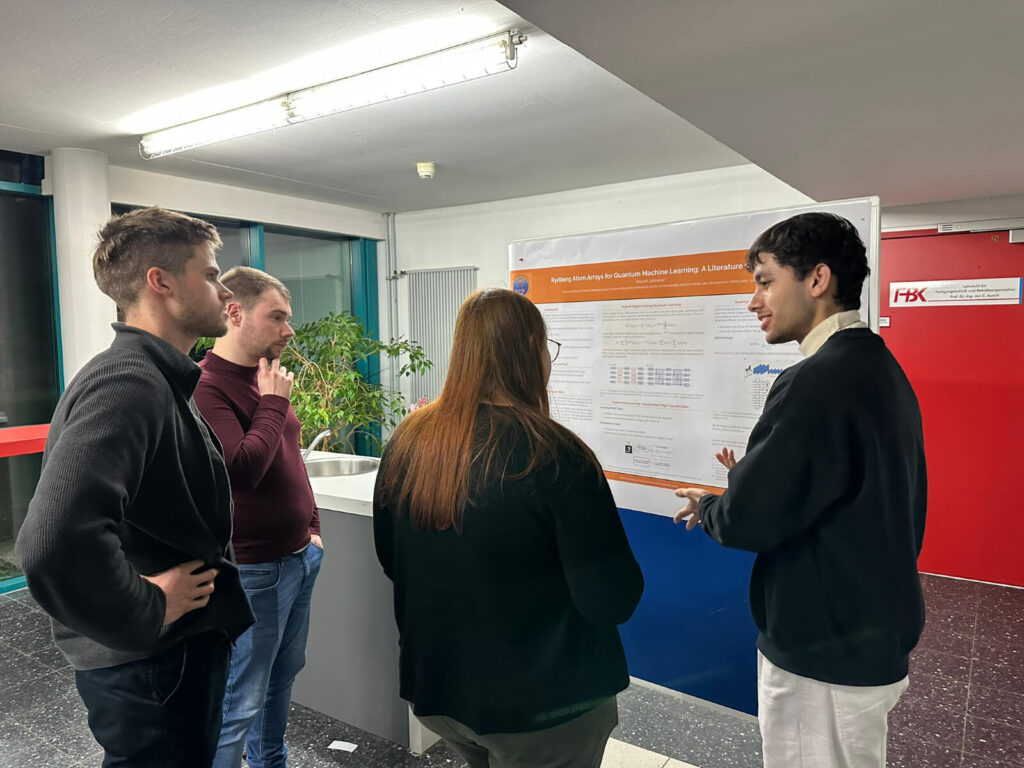
The QUIKSTART Winter School on Quantum Machine Learning (QML) is the second winter school of its kind and is organized by Valeria Bartsch (Fraunhofer Center for Maritime Logistics and Services (CML)) and Maximilian Kiefer-Emmanouilidis (German Research Center for Artificial Intelligence (DFKI) and RPTU Kaiserslautern). QUIKSTART X 2025 successfully began on February 17, 2025, with around 50 participants from STEM fields (such as computer science, physics, mathematics, bioengineering) in Kaiserslautern and 30-50 participants joining remotely. Participants come from all over the world (Ukraine, India, France, United Kingdom, Canada, Egypt, Australia, Germany, …) and from all continents besides antarctica.
Eighteen speakers from academia and industry (TU Munich, Xanadu, Falcondale, Fraunhofer-Gesellschaft (ITWM, IAIS, and CML), DFKI, Multiverse, data cybernetics, IQM, AWS, Bearing Point, Bechtle, …) will provide that week’s primarily bachelor’s- and master’s-level student attendees with an introduction to the state-of-the-art challenges in quantum computing and, in particular, quantum AI:
- Iraitz Montalban (CTO of Falcondale): Introduction to Quantum Machine Learning
- Daniel Wierichs, Korbinian Kottman (Xanadu): Hands-on Sessions on Quantum Computing and Quantum Machine Learning
- Sabine Müller (Fraunhofer ITWM): Introduction to Deep Learning
- Borja Aizpurua (Multiverse Computing): Introduction to Tensor Networks
- Elie Mounzer and Hans Hohenfeld (DFKI): Hands-on Session on Quantum Machine Learning
- Carsten Blank and Israel Araujo (data cybernetics): Helmstrom Measurement and QAlchemy
- Nico Piatkowski (Fraunhofer IAIS): Complexity Theory
- Josef Winter (TU Munich): Quantum CFD (Computational Fluid Dynamics)
- Sebastian Stern (AWS Braket): Estimating Required Quantum Hardware Resources and Demonstration in the Amazon Cloud
- Additional industry talks by Max Haeberlein (IQM), Elisabeth Wagner (Bearing Point), as well as Sebastian Dittrich and Fabian Brings (Bechtle AG)
QUIKSTART X 2025 is supported by the QUIP project (Quantum Initiative Rhineland-Palatinate), UpQuantVal Interreg EU Program and the QC-AI (Quantum Initiative for AI).
Quantum computing promises to accelerate critical algorithms, offering significant advantages over classical computing. However, this transformative technology entails a paradigm shift in programming that requires new skills and ways of thinking. The goal of this winter school is to equip students with the foundational skills they need to navigate this change, with a focus on the principles of programming quantum computers.
A focal point of the program is therefore quantum AI, where quantum computing intersects with artificial intelligence. Quantum AI and QML have become particularly exciting and rapidly growing fields that attract both academic and industrial interest. The merging of quantum algorithms with AI methods has the potential to revolutionize industries by tackling computational challenges that are currently unsolvable for classical systems. Examples include optimization problems in logistics and supply chain management, drug discovery and materials science, financial modeling, and advanced data analysis. The ability of quantum computers to process high-dimensional data and perform complex calculations in parallel aligns naturally with the demands of modern AI systems.
This combination is not just theoretical; many industries are already exploring quantum-assisted machine learning models for predictive analytics, fraud detection, and real-time decision-making. Quantum AI is especially relevant in areas that require massive datasets and intricate models, where quantum algorithms hold the potential for exponential speedups or resource efficiencies.
The winter school prepares participants for future innovations at the intersection of these transformative fields. A strong connection to industry and the involvement of scientists from the private sector are emphasized, to show students that quantum computing offers future prospects both within and beyond academia. Many researchers working on quantum computing are also active in industry, as this is a new field with ambitions for industrial applications.